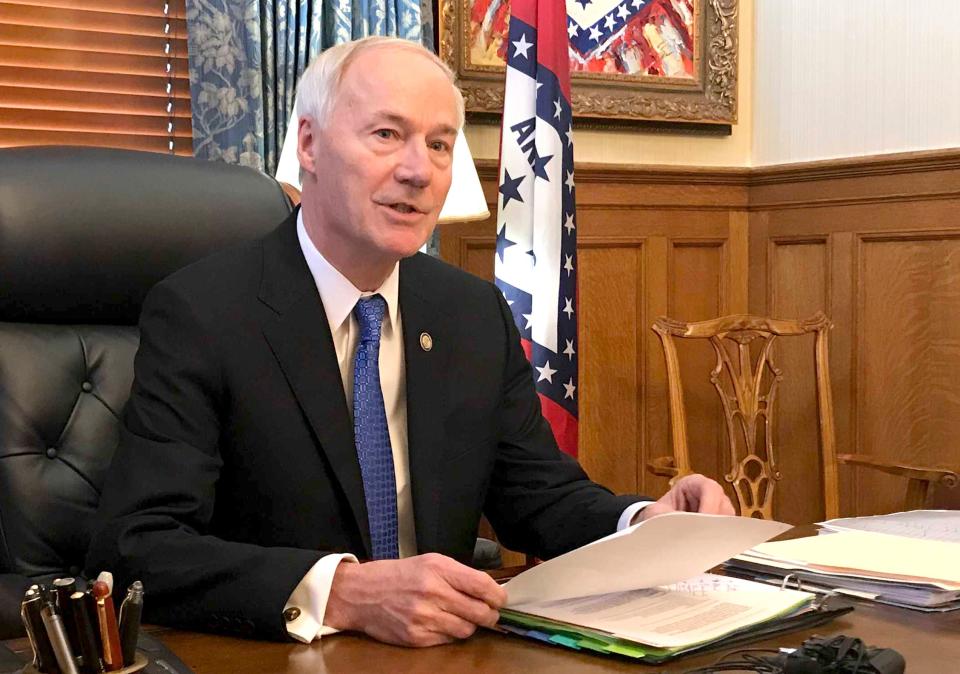Trump changes in immigration policy slowed, but states are cranking out their own new laws
MIAMI – While the Trump administration crackdown on illegal immigration hasn't made great strides because of court challenges and a reluctant Congress, some Republican states are building their own legislative wall against undocumented immigrants.
Arkansas recently banned "sanctuary cities," where local governments don't fully cooperate with federal immigration authorities. Republicans in Michigan, Montana and North Carolina are pushing similar bans.
And now Florida is on the verge of passing its own "anti-sanctuary" bill, which moved through the state House of Representatives on Wednesday and is headed to the state Senate.
Democrats, immigration activists and civil rights groups are trying everything they can to stop the Florida measure. The ACLU even issued a "travel alert" to people considering a vacation in the Sunshine State because, the organization says, travelers "could face risks of being racially profiled and being detained without probable cause."
But the GOP controls both chambers of the state legislature, and Republican Gov. Ron DeSantis – a vocal Trump supporter who made waves during his 2018 campaign after airing an ad in which he helped his daughter build a tiny border wall – is echoing the president in his push for the controversial bill.
"We do not want to be in a situation where we have more angel parents," DeSantis said at a news conference in March where he borrowed a Trump tactic of speaking alongside parents whose children were killed by undocumented immigrants. "I hope that the legislature moves quickly this session."

The push to ban sanctuary cities has flourished in recent years. Texas passed a bill barring sanctuary cities in 2017, and Iowa and Tennessee passed anti-sanctuary bills in 2018.
In fact, the number of all immigration-related bills passed by statehouses has increased dramatically since Trump took office, rising from 70 in 2016 to 175 in 2018, according to data from the National Conference of State Legislatures.
That flood has not surprised people like John Rowe, the retired chairman and CEO of utility giant Exelon, who has been fighting anti-immigration legislation in his home state of Illinois and his part-time home of Florida.
While he says he opposes – "almost violently" – Trump's actions and rhetoric bashing illegal immigrants, Rowe said the anti-immigrant push cannot be entirely blamed on the president.
"I'm not sure if it's trickling down or trickling up," Rowe said. "He didn't create these issues. They represent real concerns of a large percentage of old-fashioned Americans."
But Rowe, who grew up on a farm in Wisconsin, said those old-fashioned Americans need to get over their collective angst and realize that immigrants represent the future of America and its economy.
"The latest census statistics I've seen say the white population is not growing. All the growth is either Latino or Asian," said Rowe, now a co-chair of the American Business Immigration Coalition. "So we'd better be working at helping these people be part of the economy because they're a huge part of the future, and you'd better make it work."

Rowe and other immigration advocates have some reason for hope. Several statehouses are moving legislation that would make life far easier for immigrants.
With Democrats now controlling the statehouse in Albany, legislators are considering a bill to make New York an open "sanctuary state" that prevents local cities from detaining undocumented immigrants solely for federal immigration authorities. The state also is considering a bill to allow some undocumented immigrants to get driver's licenses.
Colorado legislators have been debating a bill that makes it clear that local police officers cannot detain undocumented immigrants solely at the request of Immigration and Customs Enforcement agents.
And even in Arkansas, which passed its own anti-sanctuary city bill this month, Republican Gov. Asa Hutchinson also signed two new laws that allow undocumented immigrants enrolled in the Deferred Action for Childhood Arrivals Program, or DACA, to pay in-state tuition for state colleges and to get nursing licenses once they've graduated.
That follows an emerging trend in which more states are using occupational licensing bills to grant immigrants broader rights. In 2018, nine states passed laws making it easier for immigrants to get certified and licensed to work in specific fields, according to the National Conference of State Legislatures.
Ali Noorani, executive director of the National Immigration Forum, a group that advocates on behalf of immigrants, said that trend shows how states that have been historically hostile toward immigrants can gradually change course.
Noorani's group has tried to expand immigrant rights by appealing to business, faith, and law enforcement leaders. In the case of Arkansas, he said, state leaders realized that they had a statewide nursing shortage and that immigrants could help fill the gap.
"It seems like it was a bit of pragmatism that got the state beyond the ideology that you see in a lot of other places," Noorani said. "A bill like that allows conservatives to take a step forward and realize that the world is not going to break down. In this environment, those positive things are more important than ever."

Despite those successes, Republicans are forging ahead with plans to police immigration within their own borders.
Ira Mehlman, a spokesman for the Federation for American Immigration Reform, a group that advocates for lower levels of legal and illegal immigration, said state leaders were hesitant to pass bills designed to enhance immigration enforcement under former President Barack Obama because they knew his Department of Justice would challenge them in court.
Justice Department lawyers did just that in several high-profile cases, including lawsuits challenging laws in Arizona, Alabama and South Carolina that tried to use local law enforcement to enforce federal immigration laws.
Now under Trump, the Justice Department has changed course. It filed a lawsuit against California challenging its sanctuary policies. And Mehlman said states can move ahead with plans to enhance immigration enforcement knowing that the Justice Department probably won't challenge their actions in court.
"That's probably off the table for now," Mehlman said. "The federal government is not going to sue you for saying yes to what they're asking for."
Want to read more? Download the USA TODAY app
This article originally appeared on USA TODAY: Trump changes in immigration policy slowed, but states are cranking out their own new laws

